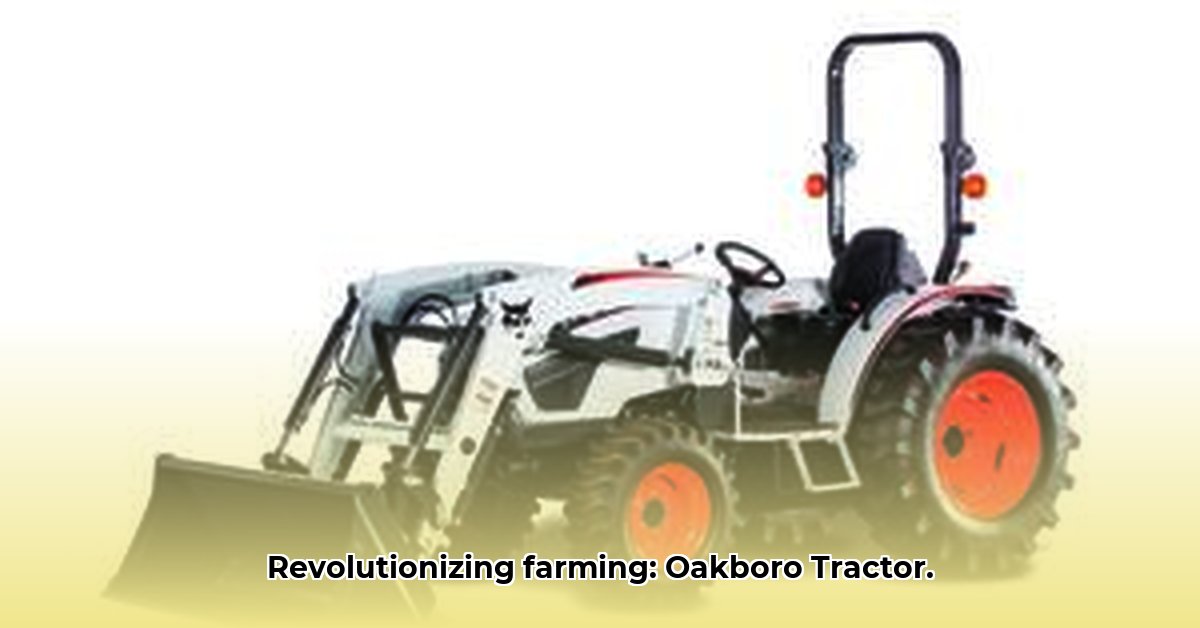
A North Carolina Case Study in Sustainable Agriculture
Oakboro Tractor & Equipment (OTE) has served North Carolina farmers since 1990, establishing a strong reputation through its provision of reliable equipment from brands including Bobcat, Husqvarna, Stihl, and Echo. However, its potential contribution to sustainable agriculture requires deeper analysis. This article examines OTE's current role, the challenges it faces, and actionable strategies for becoming a leader in environmentally responsible farming practices. The scarcity of publicly available data presents a significant limitation to a complete assessment. For more information on OTE, visit their website: OTE Website.
A Closer Look at Oakboro Tractor's Current Practices
While OTE boasts a loyal clientele, readily available information regarding its specific sustainability initiatives is limited. Its website lacks detailed information on eco-friendly equipment or efforts to reduce its carbon footprint. The absence of transparent data on used equipment inventory – crucial for promoting a circular economy and minimizing waste – hinders a comprehensive evaluation of its environmental impact. This lack of transparency makes it difficult to definitively assess its current contribution to sustainable agriculture. Further investigation into OTE's internal practices is needed.
Stakeholder Analysis: Diverse Interests and Goals
OTE's success in promoting sustainable agriculture depends on the alignment of various stakeholders. Their differing goals and perspectives necessitate a collaborative approach.
| Stakeholder | Short-Term Goals | Long-Term Goals |
|---|---|---|
| OTE Management | Data collection, clear communication of sustainability strategies, employee training programs. | Strategic partnerships, exploration of alternative fuels, expanding repair services for older, repairable equipment. |
| Local Farmers | Improved equipment accessibility, enhanced productivity, reduced operating expenses. | Higher yields, lower environmental impact, cost-effective solutions. |
| Local Government | Supporting OTE's sustainability efforts through policy and incentives. | Promoting sustainable farming practices, encouraging adoption of green technologies, and fostering economic growth. |
| Environmental Groups | Monitoring OTE's environmental impact, collaborative projects on sustainability. | Advocating for eco-conscious farming, educating the community on sustainable practices, and championing responsible land management. |
Challenges and Opportunities: Navigating the Path to Sustainability
OTE faces considerable challenges in its pursuit of sustainable practices. The most significant hurdle is the lack of publicly accessible data, making it difficult to quantify its environmental impact and assess progress. Its current focus on established brands, while reliable, may not represent the most environmentally friendly options. Furthermore, economic uncertainties within the agricultural sector and competition from other equipment suppliers add layers of complexity.
However, OTE also possesses significant advantages. Its extensive network and strong relationships with farmers present a unique opportunity to influence the adoption of sustainable agriculture within the region. Its established presence positions it to become a model for other dealerships in the state.
A Roadmap for Sustainable Practices: Actionable Recommendations
To effectively integrate sustainability into its operations, OTE must adopt a multi-pronged approach:
Transparency and Data Collection: Publicly share key operational data and environmental impact metrics to build trust with stakeholders and demonstrate commitment to transparency. (Efficacy: Improved stakeholder relationships, increased trust)
Invest in Employee Training: Provide comprehensive training on sustainable farming practices and the use of environmentally friendly equipment to empower employees to contribute to this initiative. (Efficacy: Enhanced operational efficiency, improved service quality)
Strategic Partnerships: Collaborate with local farmers, research institutions, and environmental groups to leverage collective expertise and resources, accelerating the adoption of sustainable technologies and best practices. (Efficacy: Access to innovative solutions, resource optimization)
Explore Alternative Technologies: Actively research and implement alternative fuels and precision agriculture equipment that minimize resource consumption and environmental impact. (Efficacy: Reduced environmental footprint, improved operational efficiency)
Circular Economy Initiatives: Establish a robust system for managing, evaluating, and selling pre-owned equipment to support a circular economy, reducing waste and offering cost-effective options to farmers. (Efficacy: Waste reduction, enhanced affordability for farmers)
Regulatory Compliance: Maintain full compliance with all relevant environmental regulations to ensure ethical operations and avoid potential penalties. (Efficacy: Risk mitigation, ethical operations)
Conclusion: The Future of Sustainable Farming in North Carolina
Oakboro Tractor & Equipment has the potential to become a leader in sustainable agriculture in North Carolina. By embracing transparency, investing in employee training, forging strategic partnerships, and exploring innovative technologies, OTE can significantly contribute to a more environmentally responsible farming sector. The adoption of these recommendations will require commitment, but the potential rewards for OTE, its customers, and the environment are substantial. The path forward necessitates a proactive approach focused on data-driven decision-making and a commitment to open communication.